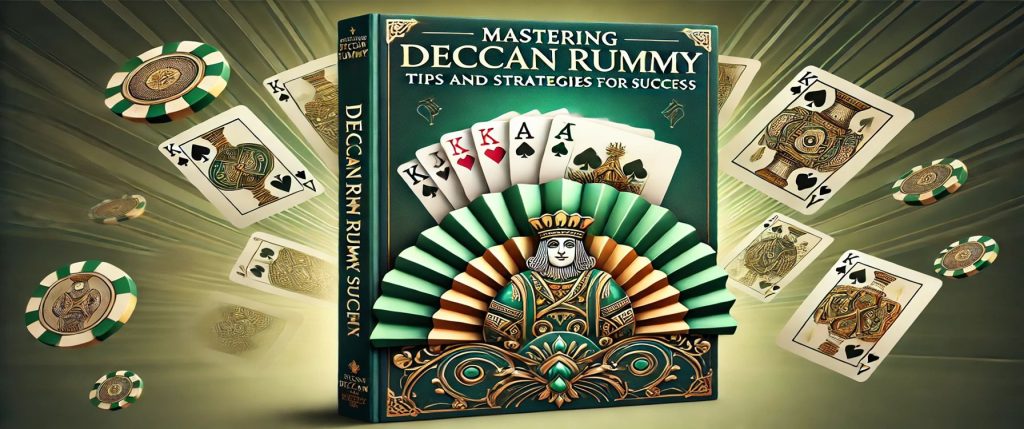Description

Deccan Rummy: A Complete Guide Deccan Rummy is a well-liked card game that has become very popular in India & among card players all over the world. It is a variation of the classic rummy game, distinguished by its own set of rules & strategies. Usually, two to six players play the game with two decks of cards, including jokers.
The main goal is to combine cards to create legitimate sets and sequences, which can be accomplished by carefully selecting which cards to draw and discard. Because it takes both skill and a little bit of luck to win, players need to be good at seeing patterns and making snap decisions. Fundamentally, Deccan Rummy requires a thorough comprehension of the game’s rules and strategies in addition to a fair amount of luck.
A predetermined number of cards are dealt to each player, and the remaining cards are arranged in a draw pile. In order to improve their hands by creating valid combinations, players alternately draw from the draw pile or the discard pile. One sequence and one set, or at least two sequences, make up a valid combination.
A player declares “Rummy” and wins the round when they successfully meld their entire hand. Anyone hoping to succeed at Deccan Rummy must comprehend these basic elements. Deccan Rummy players need to build a strong strategy that includes both offensive and defensive play if they want to succeed. Evaluating the first hand you are dealt is the first step in developing a successful strategy.
Players should focus on using their cards to form sequences while also watching for possible sets. Making pure sequences—which are made up of three or more consecutive cards of the same suit—without the use of jokers is crucial. This not only lowers points but also offers a strong basis for subsequent melds. Players should also be careful which cards they discard & which ones they pick up because these choices can have a big influence on their overall strategy. A crucial component of Deccan Rummy strategy is flexibility.
Players need to be ready to modify their strategies as the game goes on in response to the cards they draw and the moves made by their rivals. You can learn a lot about other players’ hands by watching how they discard cards, which will help you decide which ones to keep or discard. Also, it’s critical to strike a balance between defense and attack; in addition to trying to finish your hand, you should think about preventing your opponents from forming their combinations. By using this two-pronged strategy, you can increase your chances of winning & keep your opponents guessing. In Deccan Rummy, creating a winning hand necessitates both strategic card management and strategic thinking.
Early in the game, giving priority to forming sequences is a useful strategy. If another player declares rummy before you do, you can reduce your point total by concentrating on making pure sequences first. It’s also a good idea to record which cards your opponents have thrown out, since this will help you decide which cards to keep or discard. Certain cards may be less likely to assist your opponents in finishing their hands if you observe that they are being discarded frequently.
Keeping your strategy flexible is a crucial component of creating a winning hand. Be willing to change your plans as the game progresses and you draw new cards. For example, if you started out aiming for a particular sequence but find that it is getting harder to finish, think about changing your strategy to create a different combination. Keeping your opponents guessing and preventing them from anticipating your next move can be greatly aided by this flexibility.
In Deccan Rummy, a player’s ability to stay alert, adaptable, and strategic throughout the game is ultimately what determines whether they have a successful hand. In Deccan Rummy, bluffing is a crucial skill that has a big impact on the game’s result. Subtlety is essential for misleading opponents about the strength of your hand, even though it may not be as obvious as in poker. Discarding cards that could give your opponents the impression that you are aiming for a specific set or sequence while actually working toward a different combination is an efficient bluffing tactic.
Due to erroneous assumptions about your hand, this misdirection may cause confusion and compel your opponents to make bad choices. In addition, timing is crucial when it comes to Deccan Rummy bluffing. When using their draws & discards, players should be careful to make their intentions clear.
It might cause suspicion among your opponents, for example, if you have been routinely discarding high-value cards and then unexpectedly pick up a card that could finish a sequence for you. To combat this, think about varying your gameplay by sporadically discarding low-value cards that don’t add to your hand while keeping things unpredictable. Although it takes time & careful observation to become proficient, bluffing can give you a big edge in competitive play. Understanding patterns and sequences is essential for Deccan Rummy success.
The cards that are being played & discarded during the game require players to become acutely aware of them. This entails monitoring both your own hand and your opponents’ movements. You can learn a lot about their tactics and possible combinations by keeping an eye on the cards they choose to keep or discard.
Your chances of creating legitimate melds will eventually increase if you use this information to guide your own decisions about which cards to keep or discard. Players can also anticipate possible moves from their opponents by being aware of common patterns in card combinations. If an opponent has been gathering cards from a particular suit, for instance, it can mean they are trying to finish a set or sequence that uses those cards. If you spot these trends early on, you can modify your approach to take advantage of their weaknesses by either blocking their progress or changing your own gameplay.
Gaining proficiency in this area can greatly improve your Deccan Rummy performance, but it takes time and experience. Being a wild card that can be used to form sets or sequences in Deccan Rummy, the joker is an essential component of the game. But making good use of the joker necessitates thoughtful deliberation and strategic preparation. Using jokers to finish unfinished sets or sequences that would be difficult to meld with the cards at hand is a popular strategy.
For example, using a joker can help you finish that meld and lower your total points if you have two cards in a row of the same suit but don’t have the third card required for a pure sequence. Also, players should exercise caution when using jokers during gameplay. Jokers can be very helpful for finishing hands fast, but using them excessively could give opponents who are watching your gameplay a hint that you are weak.
It’s usually a good idea to save jokers for crucial situations where they can have the biggest effect on the strength of your hand or when you’re about to rummy declare. You can improve your overall strategy and keep your opponents guessing about your true intentions by balancing the use of jokers with more conventional card combinations. In Deccan Rummy, it is equally important to discard cards efficiently as it is to draw them. By keeping opponents from finishing their hands, a well-planned discard strategy can increase your chances of winning. Throwing away valuable cards that don’t add to any possible melds in your hand is a good strategy.
You reduce the number of points you would receive if another player declares rummy before you do. Making decisions about what to discard can also be aided by keeping track of which cards have been thrown away by others. Timing & observation are two more crucial components of the discard strategy. Players should consider what they discard in light of their opponents’ moves; for example, it might be prudent to refrain from discarding any cards from a particular suit or rank if an opponent has been collecting those cards. Instead, concentrate on finishing your own hand while discarding cards that are unlikely to help others. This tactic not only increases your chances of winning, but it also gives your opponents a psychological advantage as they attempt to figure out what you’re up to.
For best results when playing Deccan Rummy, it is imperative to remain composed. If players aren’t careful, the game’s fast-paced nature can cause heightened emotions and rash decisions. Before every game session, establish a routine to help you stay composed and focused.
This could be taking deep breaths or imagining successful plays before you start playing. Players can improve their ability to control their stress levels and stay focused during gameplay by creating this mental model. Also, maintaining focus necessitates actively playing with both your opponents’ & your own hands. Steer clear of outside distractions like background chatter or noise, and instead focus on assessing the game’s flow and modifying your approach accordingly.
Playing games with mindfulness can also help players focus better because it enables them to make thoughtful decisions instead of depending just on their feelings or instincts. Maintaining composure will ultimately enhance everyone’s gaming experience in addition to enhancing individual performance. To sum up, learning the basics of Deccan Rummy and creating strategies that work for different play styles are essential to mastering the game.
Players can greatly increase their chances of winning this captivating card game by identifying patterns, making careful use of jokers, using efficient discard strategies, and remaining composed throughout games. Regardless of your level of experience or desire to improve, these insights will be helpful resources as you work to become a skilled Deccan Rummy player.
